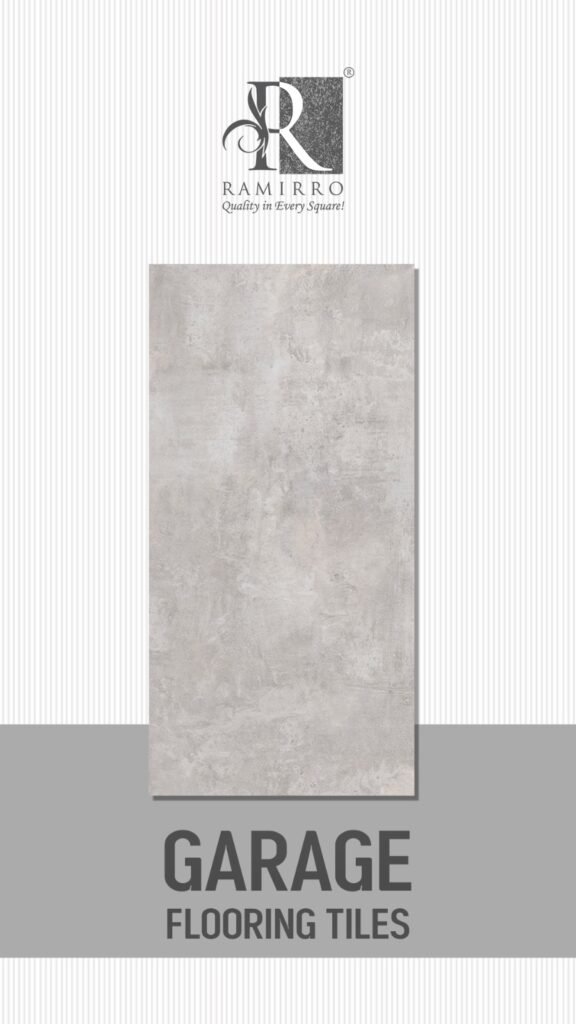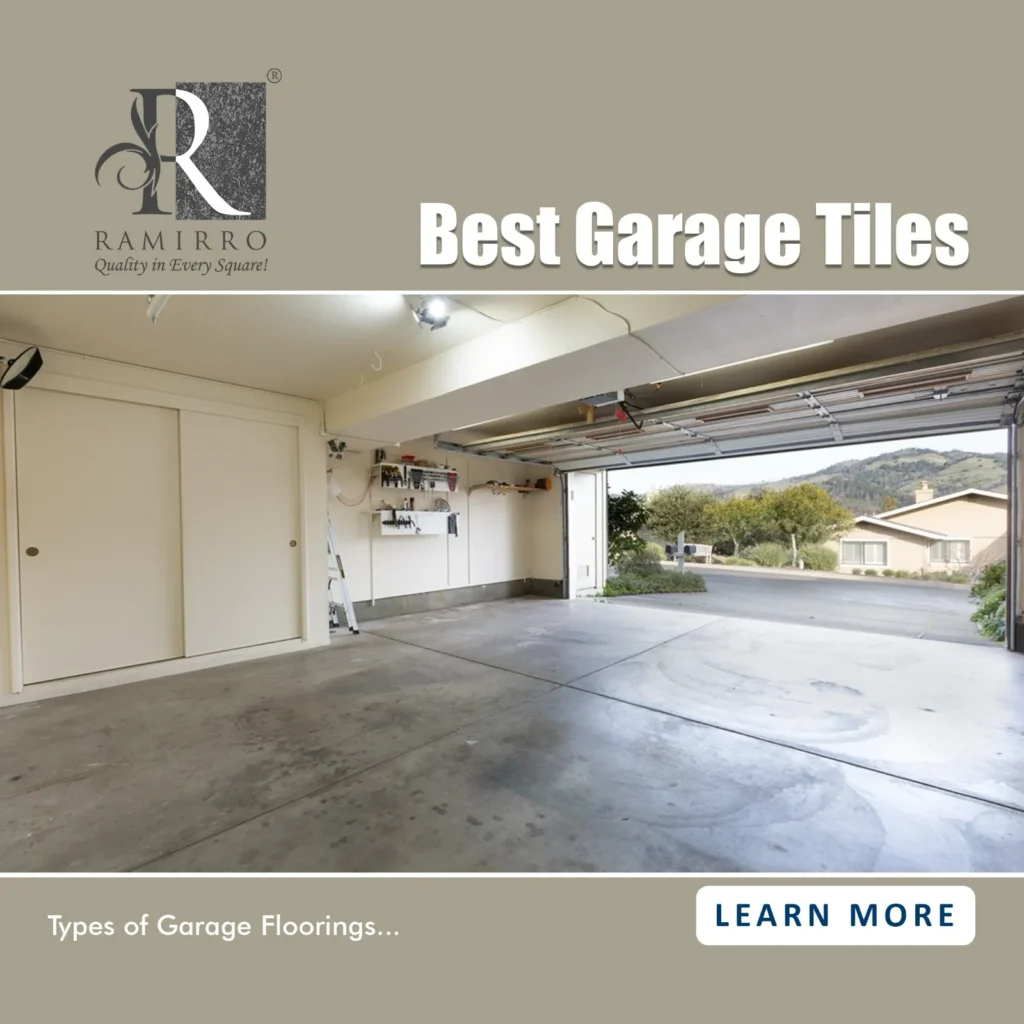Revamping your garage can significantly enhance both its aesthetic appeal and functionality. One of the key elements in this transformation is choosing the right garage flooring. Garage tiles are an excellent choice, offering durability, style, and ease of maintenance. In this guide, we’ll delve into the world of garage tiles and the various types you can consider for your project.
Things you must know while buying Garage Tiles
Garage tiles are a versatile flooring solution that can instantly revitalize your space. They come in a wide array of materials, styles, and colors, allowing you to customize your garage to suit your taste and needs. Here are some compelling reasons why garage tiles are a top choice for many homeowners:
- Durability: Garage tiles are designed to withstand the heavy loads, impact, and wear and tear that a garage floor typically experiences.
- Easy Installation: Most garage tiles feature a simple interlocking system, enabling hassle-free installation, often without the need for adhesives.
- Customization: With an abundance of design options, you can create a unique and personalized look for your garage. Mix and match colors or create patterns for a bespoke flooring design.
- Low Maintenance: Garage tiles are easy to clean and maintain, making them a practical choice for busy individuals.
Types of Garage Floorings
When it comes to choosing the right type of garage tile for your space, several options cater to various preferences and requirements. Here are the main types:
1. Polypropylene Tiles
Polypropylene tiles are a popular choice due to their durability and versatility. They provide excellent resistance to chemicals, oils, and solvents, making them suitable for a garage environment. Additionally, they are known for their easy installation and maintenance.
2. PVC Tiles
PVC tiles, also known as vinyl tiles, offer a softer and more flexible flooring solution. They provide good resistance to chemicals and are comfortable to walk on. PVC tiles are available in a wide range of colors and patterns, giving you plenty of design options.
3. Rubber Tiles
Rubber tiles are prized for their exceptional durability and resistance to heavy loads and impacts. They offer excellent insulation against noise and temperature, making them ideal for a functional yet comfortable garage space.
4. Foam Tiles
Foam tiles provide a lightweight and cushioned flooring option. They are easy to install and comfortable to stand on for extended periods. Foam tiles are suitable for creating a workshop or exercise area within your garage.
5. Porcelain tiles:
Porcelain tiles are known for their durability, resistance to moisture, and ability to withstand heavy loads and high traffic. They are also resistant to chemicals and stains, making them a practical choice for a garage environment where exposure to various substances is common. Additionally, porcelain tiles are relatively easy to clean and maintain, which is a key consideration for garage flooring. However, it’s important to ensure that the porcelain tiles chosen have a slip-resistant surface to enhance safety in the garage.
Comparing Porcelain, Polypropylene Tiles, PVC, Rubber and Foam Tiles for Garage
- Durability:
- Porcelain Tiles: Highly durable, resistant to heavy loads, and can endure high traffic.
- Polypropylene Tiles: Durable and can withstand heavy loads and impact.
- PVC Tiles: Durable and can handle moderate to heavy traffic.
- Rubber Tiles: Extremely durable and resistant to heavy loads and impacts.
- Foam Tiles: Less durable compared to the other options, better suited for lighter use.
- Resistance:
- Porcelain Tiles: Resistant to moisture, chemicals, and stains.
- Polypropylene Tiles: Resistant to chemicals and oils.
- PVC Tiles: Resistant to chemicals and comfortable to walk on.
- Rubber Tiles: Resistant to chemicals, oils, and solvents.
- Foam Tiles: Less resistant to chemicals and can be affected by oils.
- Installation:
- Porcelain Tiles: Moderate installation complexity, typically requires professional installation.
- Polypropylene Tiles: Easy interlocking system for simple installation.
- PVC Tiles: Easy installation with interlocking mechanisms.
- Rubber Tiles: Relatively easy installation with interlocking or glue-down options.
- Foam Tiles: Easy DIY installation due to lightweight and interlocking design.
- Comfort:
- Porcelain Tiles: Hard surface, less comfortable for prolonged standing or activities.
- Polypropylene Tiles: Firmer surface but more comfortable than porcelain for standing and activities.
- PVC Tiles: Softer and more comfortable underfoot compared to porcelain and polypropylene.
- Rubber Tiles: Cushioned and comfortable for standing and activities.
- Foam Tiles: Soft and cushioned, providing the most comfort.
- Design Options:
- Porcelain Tiles: Various design options, including different colors and patterns.
- Polypropylene Tiles: Limited design options, mainly solid colors and simple patterns.
- PVC Tiles: Diverse design options with various colors and patterns.
- Rubber Tiles: Limited design options, often solid colors or simple patterns.
- Foam Tiles: Limited design options, usually solid colors or wood-grain patterns.
Understanding Pros and Cons of Garage flooring material types
Each of the above material described has its pros and cons for garage floorings.
| Parameter | Porcelain Tiles | Polypropylene Tiles | PVC Tiles | Rubber Tiles | Foam Tiles |
|---|---|---|---|---|---|
| Durability | High | High | Medium | High | Low |
| Moisture Resistance | High | High | High | High | Low |
| Chemical Resistance | High | High | Medium-High | High | Low |
| Maintenance | Low | Low | Low | Low | Low |
| Installation | Complex | Easy | Easy | Easy | Easy |
| Comfort | Low | Medium | Medium | High | High |
| Cost | High | Medium | Low-Medium | Medium | Low |
| Aesthetics | High | Medium-High | Medium-High | High | Low |
| Sound Insulation | Low | Low | Low | High | High |
Pros and Cons of Using Porcelain tiles in Garage
There are variety of options to choose from above, But as a tiling expert I would like to have you look on porcelain flooring option as well for garage tiles. Porcelain tiles can be a great option for garage flooring, but it’s important to weigh their pros and cons before making a decision.
Pros:
- Durability: Porcelain tiles are extremely durable and can withstand heavy loads and high traffic, making them ideal for a garage setting.
- Resistance to Moisture: Porcelain tiles are non-porous, making them resistant to moisture, spills, and stains commonly encountered in a garage.
- Chemical Resistance: They are resistant to chemicals like oils, grease, and automotive fluids, which are common in a garage environment.
- Low Maintenance: Porcelain tiles are easy to clean and maintain. Regular sweeping and occasional mopping are usually sufficient.
- Aesthetics: Porcelain tiles offer a variety of designs, colors, and patterns, allowing you to achieve the desired aesthetic for your garage.
- Longevity: When properly installed and maintained, porcelain tiles can last for many years, providing a long-term flooring solution.
- Temperature Resistance: Porcelain tiles can handle temperature changes and are not easily affected by extreme hot or cold conditions.
- Non Slip tiles: Porcelain tiles can also provide extra grip to avoid slippery surfaces while washing cars.
Cons:
- Hardness: The hardness of porcelain tiles can make them uncomfortable to stand on for extended periods, especially if you work in the garage frequently. You can buy thick tiles to eliminate this issue.
- Installation Difficulty: Installing porcelain tiles can be complex, especially for DIYers. It often requires professional installation.You can hire professional to install it.
- Cost: Porcelain tiles can be more expensive compared to other garage flooring options, such as epoxy coatings or vinyl tiles. It will cost initial but will last longer for 10 years time period.
- Fragility: While durable, porcelain tiles can chip or crack if heavy objects are dropped on them or if the floor is not properly leveled. To avoid this buy Full body tiles.
- Coldness: Porcelain tiles can feel cold during colder seasons, which might be uncomfortable for some individuals. You can install heater system below tiles to avoid this issue.
Considering these pros and cons, porcelain tiles can be an excellent choice for garage flooring, particularly if you prioritize durability, resistance to moisture and chemicals, and a visually appealing finish. However, it’s crucial to assess your specific needs and preferences before making a final decision.
Types of Porcelain flooring tiles Suitable for garage :
When considering porcelain flooring tiles for a garage, it’s important to prioritize durability, resistance, and safety. Here are the types of porcelain flooring tiles that are suitable for garage applications while incorporating an anti-skid layer:
- Parking Tiles: Parking tiles are designed to withstand heavy loads and are highly durable, making them suitable for garage use. They often come with anti-skid properties, providing grip even in wet conditions.
- Full Body Tiles: Full body porcelain tiles have consistent color and pattern throughout the entire thickness of the tile. They offer excellent durability and can handle the demands of a garage environment. Look for options with an anti-skid layer to enhance safety.
- Color Body Tiles: Color body porcelain tiles have a color that runs through the body of the tile, providing a consistent appearance even if the surface chips. They are a durable option for garage flooring and should have an anti-skid layer for safety.
- Thick Porcelain Tiles: Opt for thick porcelain tiles, often around 10mm or more, for added durability in a garage setting. These tiles can withstand heavy loads and the wear and tear associated with a garage. Ensure they have an anti-skid layer to prevent slips.
Each of these types of porcelain tiles can be a viable choice for a garage floor, offering durability, resistance to moisture and chemicals, and the added safety feature of an anti-skid layer. Always verify the specifications and properties of the specific tiles you are considering to ensure they meet your garage flooring requirements.
To learn more about porcelain tiles – You can chat with our tiling expert for FREE ADVICE






Why Should You Trust us?
Here’s what you get out of our article. Our team have various Ceramic Experts with experience of more than 25 Years, researches on problems our customer faces in tiling industry.
Ramirro Ceramica, – One of The Leading Tiles Manufacturer and Supplier globally, helps you people gain knowledgeable insight before making your purchase decision for products related to the floor and wall tiles.
So, we have closely monitored all kinds of trends in the ceramic tiles manufacturing world, from the old days of clay and plain color to modern digital, realistic-looking designs printed on ceramics with high-depth effects.
Our tiling Experts have seen thousands of different tiles patterns, sizes, materials, pricing, and installation techniques throughout their career.
Their expertise shared with you in simplified and organised way, helps you choose and make better decision before purchasing any flooring option available in market.
Brief about Company:
Ramirro is one of the finest Tiles manufacturers in India manufacturing porcelain and ceramic tiles. Our products have a variety of sizes and types of tiles ranging from Ceramics, porcelain, Full body etc. This helps you choose the perfect fit for your project. Plus, our collection will help you get inspiration from the architect’s design.
Here’s some more helpful links that showcase our users trust on Ramirro Ceramica Brand:
– Growth in International Market
– Trusted and Licensed Exporter
– Manufacturing Plant in India
Here’s our social proof by LinkedIn competing with top known global tiling brands:







